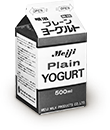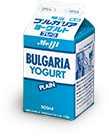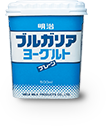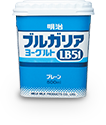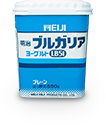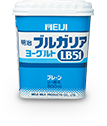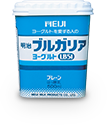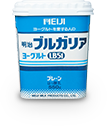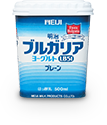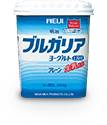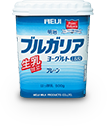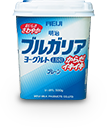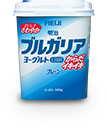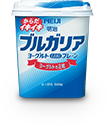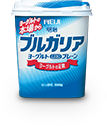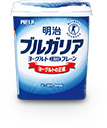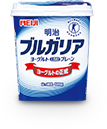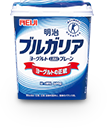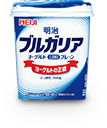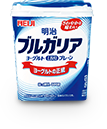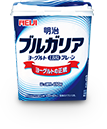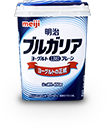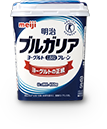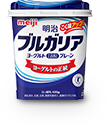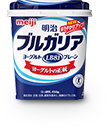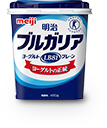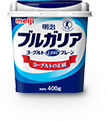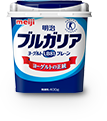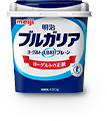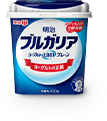- Birth of Meiji Bulgaria Yogurt
- History of Meiji Bulgaria Yogurt
- Lactic acid bacteria used in Meiji Bulgaria Yogurt
- Significance of "LB81"
- Why it is approved as a Food
for Specified Health Use (FOSHU) - New melt-in-the-mouth rich fermentation method,
in our 50th year of yogurt-making - Sound logo of Meiji Bulgaria Yogurt
- Significance of "Genuine Yogurt"
When the Osaka Expo was held in 1970, Meiji’s staff paid a visit to the Bulgarian-themed pavilion and were highly impressed by samples of their authentic plain yogurt, which led Meiji to develop its new line of products that is known as Meiji Bulgaria Yogurt today.
In order to recreate the authentic taste, Meiji’s product development team carefully studied the samples it brought back from the event, made trial products countless times, and took many trips to Europe.
In 1971, one year after its first encounter with the Bulgarian yogurt, Meiji commercially released the first plain yogurt in Japan, under the brand name of Meiji Plain Yogurt.
Then in 1972, Meiji received a license from the government of Bulgaria to use the country’s name, and changed the brand to Meiji Bulgaria Yogurt in 1973.
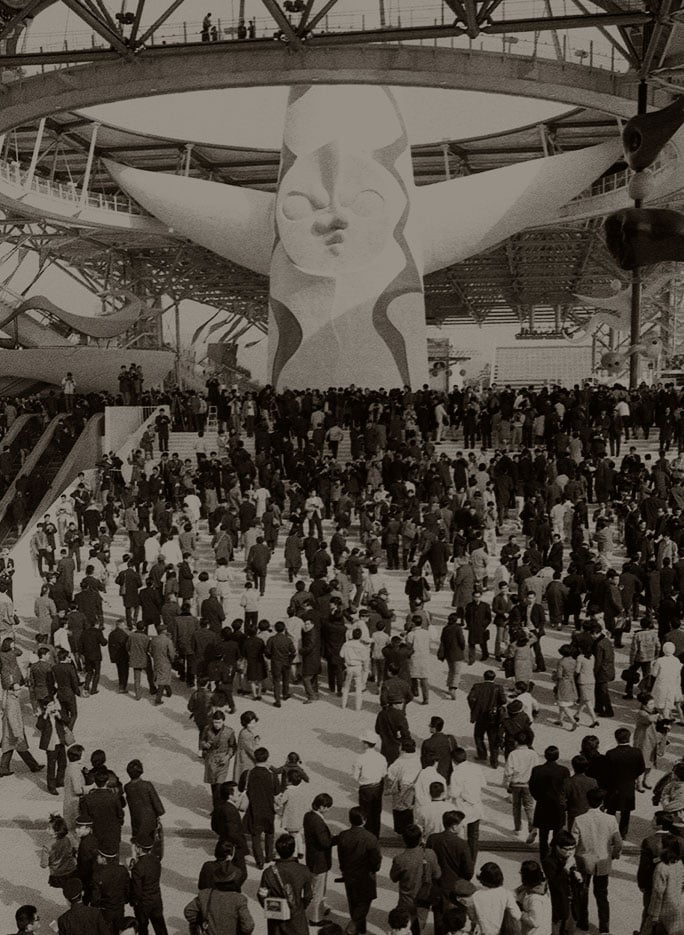
While Meiji Bulgaria Yogurt was initially sold under the brand name of Meiji Plain Yogurt, there is an interesting story behind this.
While Meiji’s product development team was considering naming it Meiji Bulgaria Yogurt when the product was still in the pipeline and approached the government of Bulgaria about it, the request was refused because “the yogurt represents our ethnic spirit, and the idea of lending the name to any yogurt made by foreigners is unthinkable.”
However, Meiji’s development team persisted in communicating its passion to bring genuine Bulgarian yogurt to dining tables in Japan by any means possible, stressing that Bulgaria was the cradle of yogurt and Meiji would only use the Bulgarian bacteria brought from the country. Its efforts eventually paid off and Bulgaria granted permission to use the name in 1972.
Meiji Plain Yogurt
when it was first sold in 1971
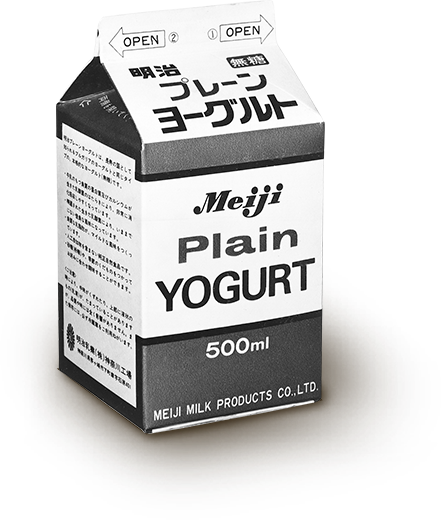
-
Commercial release of Meiji Plain Yogurt
In May 1972, permission was granted by the Embassy of Bulgaria for Meiji to use the country’s name. In December 1973, Meiji Bulgaria Yogurt was commercially released.
1971
Meiji Plain Yogurt1973
Meiji Bulgaria Yogurt
Plain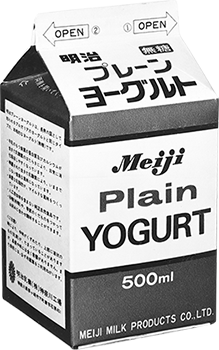
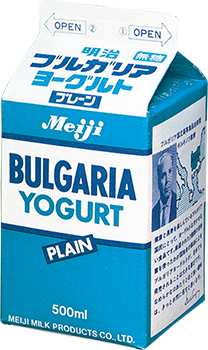
1970s
-
1980s
Package change to the current design
LB51 bacteria with superior bioactivity effects were incorporated. Meiji Bulgaria Yogurt LB51 was commercially released.
1981
Meiji Bulgaria Yogurt
Plain1984
Meiji Bulgaria Yogurt
LB51 Plain1987
Meiji Bulgaria Yogurt
LB51 Plain1988
Meiji Bulgaria Yogurt
LB51 Plain1989
Meiji Bulgaria Yogurt
LB51 Plain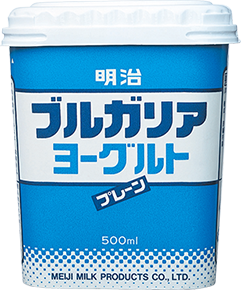
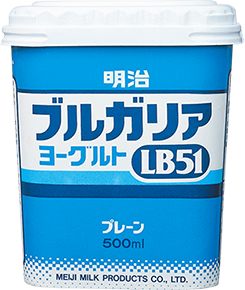
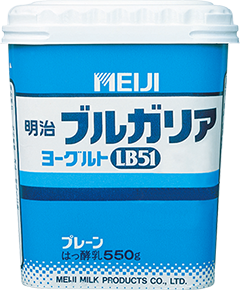
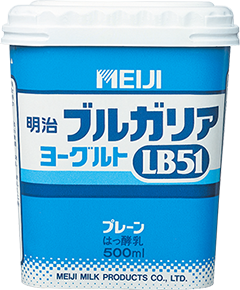
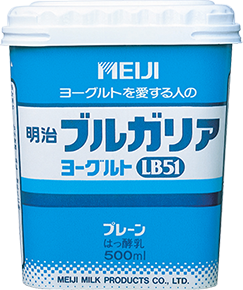
-
The lactic acid bacteria composition was changed to incorporate Lactobacillus delbrueckii subsp. bulgaricus (strain 2038) and Streptococcus thermophilus (strain 1131). The product was renewed as Meiji Bulgaria Yogurt LB81 (the number formed by combining the last digit of each bacterial strain).
Government approval as a Food for Specified Health Use (FOSHU) was obtained.
1990
Meiji Bulgaria Yogurt
LB51 Plain1991
Meiji Bulgaria Yogurt
LB51 Plain1993
Meiji Bulgaria Yogurt
LB81 Plain1995
Meiji Bulgaria Yogurt
LB81 Plain1996
Meiji Bulgaria Yogurt
LB81 Plain1999
Meiji Bulgaria Yogurt
LB81 Plain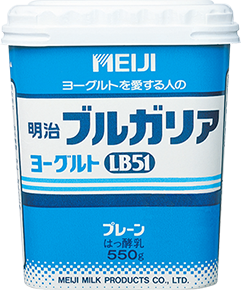
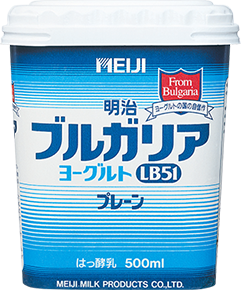
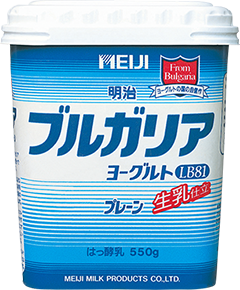
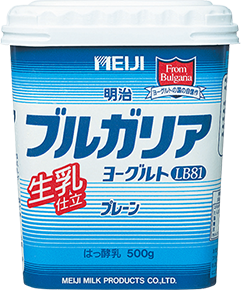
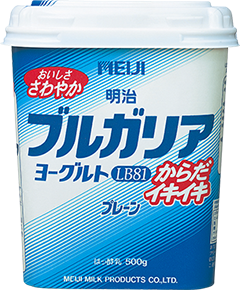
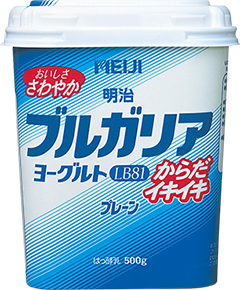
1990s
-
2000s
Merged with Meiji Seika, and the corporate logo was changed.
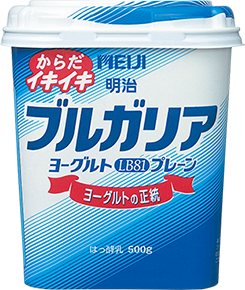
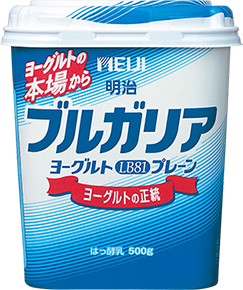
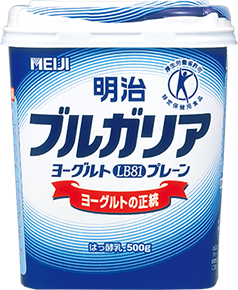
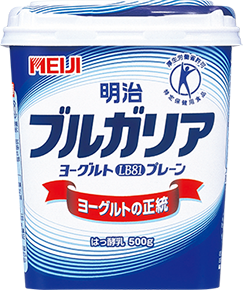
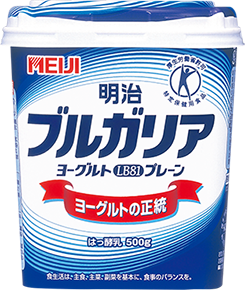
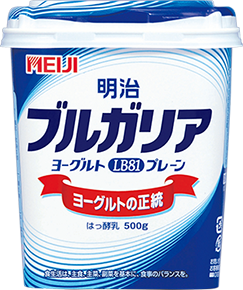
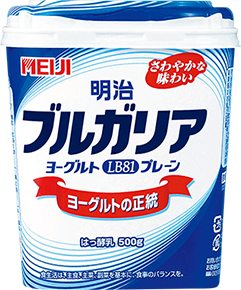
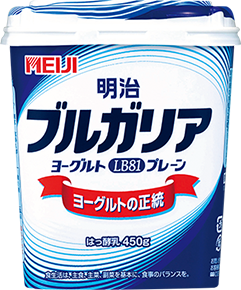
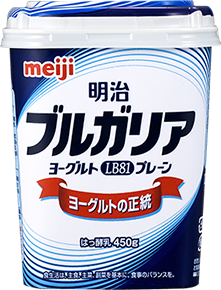 2000
2000
Meiji Bulgaria Yogurt
LB81 Plain2001
Meiji Bulgaria Yogurt
LB81 Plain2003
Meiji Bulgaria Yogurt
LB81 Plain2005
Meiji Bulgaria Yogurt
LB81 Plain2006
Meiji Bulgaria Yogurt
LB81 Plain2007
Meiji Bulgaria Yogurt
LB81 Plain2008
Meiji Bulgaria Yogurt
LB81 Plain2009
Meiji Bulgaria Yogurt
LB81 Plain2009
Meiji Bulgaria Yogurt
LB81 Plain -
2010
Meiji Bulgaria Yogurt
LB81 Plain2012
Meiji Bulgaria Yogurt
LB81 Plain2014
Meiji Bulgaria Yogurt
LB81 Plain2017
Meiji Bulgaria Yogurt
LB81 Plain2018
Meiji Bulgaria Yogurt
LB81 Plain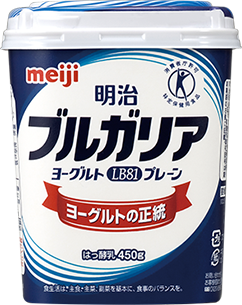
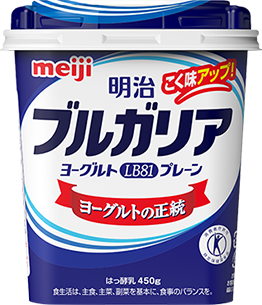
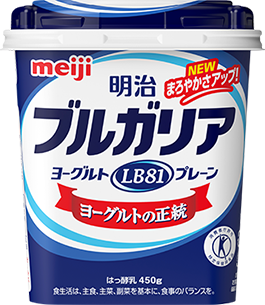
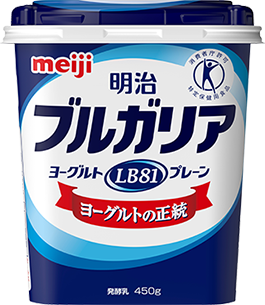
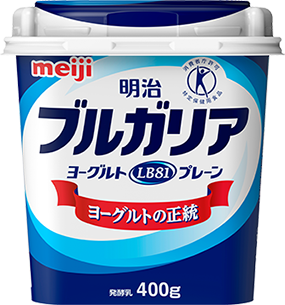
2010s
-
2020s
2020
Meiji Bulgaria Yogurt
LB81 Plain2022
Meiji Bulgaria Yogurt
LB81 Plain2023
Meiji Bulgaria Yogurt
LB81 Plain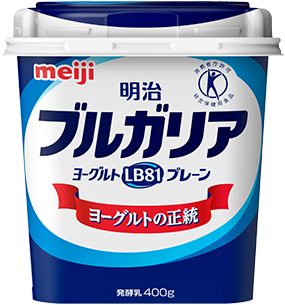
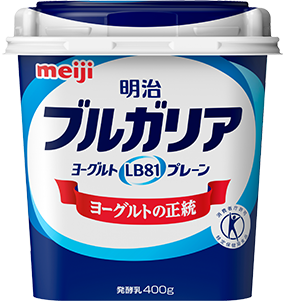
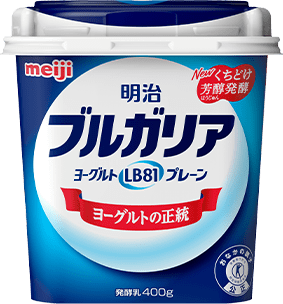
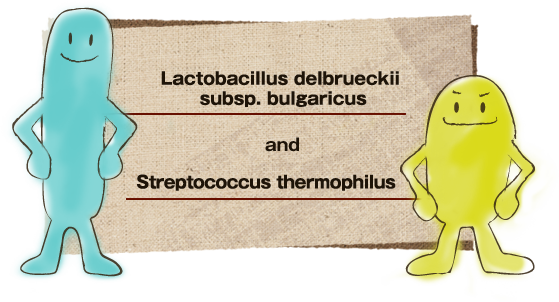
The lactic acid bacteria used in Meiji Bulgaria Yogurt are the same types of bacteria that have been used in yogurt making since ancient times: Lactobacillus delbrueckii subsp. bulgaricus (a type of bacillus) and Streptococcus thermophilus (a type of coccus).

When these two bacteria are mixed with milk, S. thermophilus, which is the faster-growing strain, first propagates using the minute amounts of amino acids and peptides that are present in the milk, while producing formic acid in the process, which is essential for L. bulgaricus to grow.
Then L. bulgaricus uses the formic acid to propagate, while simultaneously producing the amino acids and peptides that promote the reproduction of S. thermophilus.
This synergistic process allows large amounts of lactic acid to form quickly, making the delicious yogurt.
Meiji Bulgaria Yogurt LB81 contains two types of lactic acid bacteria, which are Lactobacillus delbrueckii subsp. bulgaricus and Streptococcus thermophilus.
The “LB81” used in the product name is taken from the strain numbers of these lactic acid bacteria, while “LB” are the initials of lactic acid bacteria. “81” is a combination of the last digit of each bacterial strain used to make the yogurt, which are L. bulgaricus strain 2038 and S. thermophilus strain 1131.
If the quality and taste of raw milk are relatively even and stable, which is the case in Japan, how the yogurt will turn out largely depends on the fermentation starter (a microbiological culture used to get the fermentation process started; lactic acid bacteria in the case of yogurt making).
So “LB81” signifies the lactic acid bacteria chosen to make Meiji Bulgaria Yogurt.
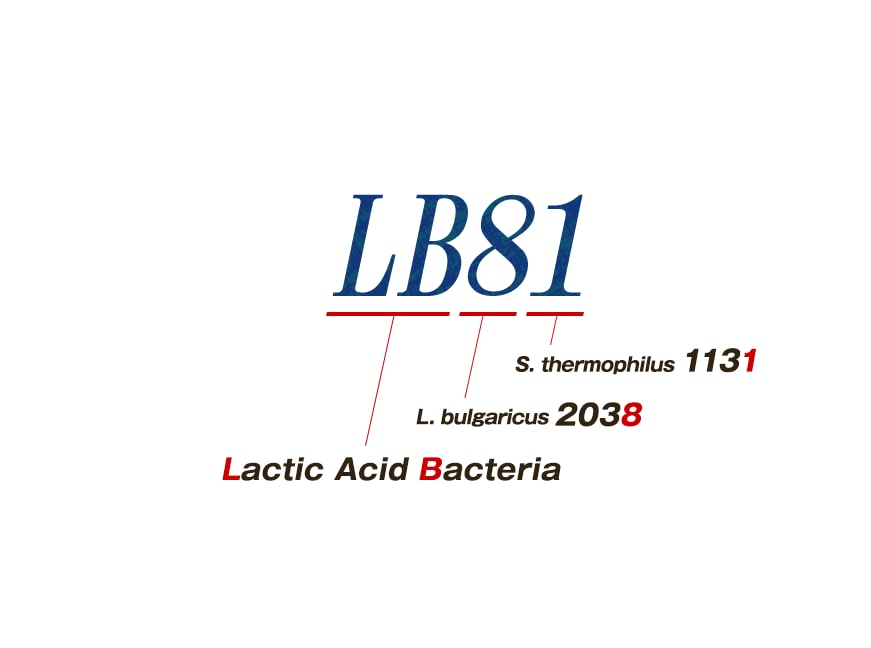
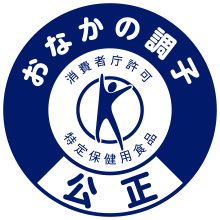
Eat a Well-Balanced Diet,
Including Staple Food and Main and Side Dishes.
In 1996, Meiji was granted permission to label Meiji Bulgaria Yogurt LB81 as a Food for Specified Health Use (FOSHU) by the Ministry of Health and Welfare (currently the Ministry of Health, Labour and Welfare (“MHLW”)).
*The administrative responsibility for the labeling of FOSHU products was transferred from the MHLW to the Consumer Affairs Agency on September 1, 2009.
So if you consume at least 100 g of the yogurt per day,
it’s scientifically proven that you’ll reap various health benefits,
including the following main ones:
Improved balance in the intestinal bacterial flora
Maintenance of sound gastrointestinal conditions
In addition to Meiji Bulgaria Yogurt LB81 Plain, Meiji also offers other yogurt products that are government-approved as FOSHU products, including yogurt beverages such as Meiji Bulgaria Yogurt Drink LB81 Plain. So if you take at least 100 ml of any of our certified beverages, etc. daily, you will receive the same health benefits as explained above.
New melt-in-the-mouth rich fermentation method, in our 50th year of yogurt-making
Flavor dramatically changes from a refreshing tangy taste the moment it enters the mouth, to a rich milkiness that builds up over time, and finally to a crisp, refreshing aftertaste.

Secrets of the new recipe①
Melt-in-the-mouth
Changes in yogurt structure by melt-in-the-mouth rich fermentation
"Ultra-high temperature pasteurization" creates a finer, denser, more delicate network than conventional methods, enhancing the melt-in-the-mouth texture and smoothness.
However, this alone makes the yogurt too soft.
This is where "fat micronization" comes in, where milk fat globules are deliberately made smaller than usual, allowing the micronized globules to reinforce the structures of the milk proteins to keep the yogurt firm.
Photographs of yogurt structure (confocal laser microscopy)
The network is noticeably denser and stronger with our melt-in-the-mouth rich fermentation method. This fermentation process keeps the firmness of the yogurt while delivering a smooth and rich flavor.
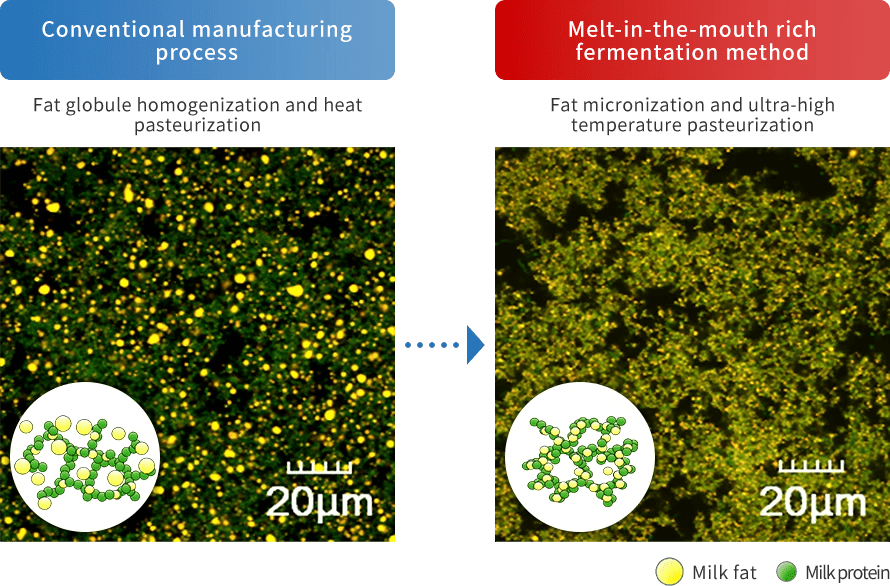
Comparison of melt-in-the-mouth texture
The yogurt disintegrates in the mouth with minimal force, offering a delightful melt-in-the-mouth experience.
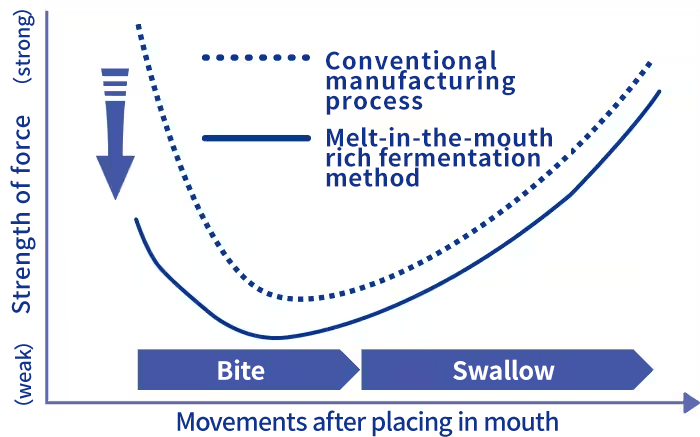
Secrets of the new recipe②
Richness and mellowness
TDS analysis of melt-in-the-mouth rich fermentation method (changes in flavor over time)
TDS
Temporal dominance
of
Sensations
Method which evaluates the most impressive (dominance) flavors over time while eating.
Able to measure multiple changes in flavor (e.g. timing and duration) at the same time.
Changes in flavor in mouth
The refreshing "tanginess" typical of Meiji Bulgaria Yogurt alternated with a milk flavor. In addition to the delicious melt-in-the-mouth texture, the balanced marriage of refreshing tanginess and milk flavor provides a rich aromatic taste.
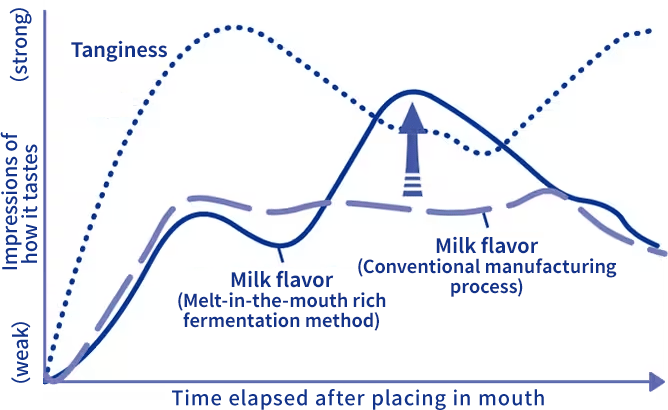


*Note: The embedded music may not play properly depending on the device.
Do you know the sound logo of our yogurt that is typically played at the end of our TV commercials,
that “♪Meiji Bulgaria Yogurt♪” jingle?
This well-known memorable music was created by renowned composer Mr. Koichi Morita.
When our first TV commercial aired,
the name “Bulgaria” was still largely unknown among the general public in Japan at the time.
So this jingle was composed to make people more familiar with the product
and to make it easier to remember the product name.
The front of the product package carries the copy “Yogurt no Seitō (Genuine Yogurt).”
This conveys that our yogurt, born from thousands of years of yogurt making originating in its birthplace of Bulgaria,
is delicious and rich in natural benefits.
This proud lineage of yogurt, which has been maintaining the health of the people of Bulgaria
– the cradle of yogurt – for centuries, miraculously arose through the fusion of the rich nature and climate native to this country
and has been passed down through generations.
This culinary heritage has been lovingly nurtured by families in the pursuit of good health.
Meiji Bulgaria Yogurt is the exact same yogurt, brought to dining tables across Japan by Meiji.
It’s the brand of genuine yogurt that has the longest history in Japan.
Since first bringing the yogurt bacteria across the ocean in the 1970s through a technical partnership between Meiji Co., Ltd. and the country of Bulgaria,
we have been carefully and continuously nurturing the same bacteria to this day.
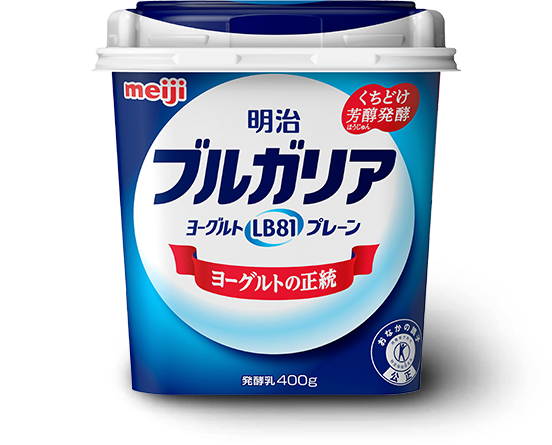


![Meiji Bulgaria Yogurt Authentic Taste Loved by Many for Decades[Genuine Yogurt]](/pc/en/about/images/yogurtbook/kv-ttl_en.png)


